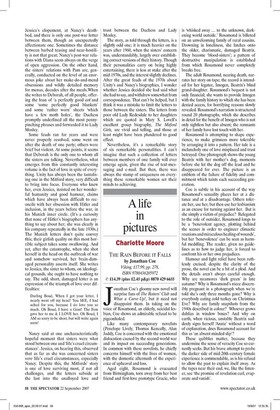A life in pictures
Charlotte Moore THE RAIN BEFORE IT FALLS by Jonathan Coe Viking, £17.99, pp. 278, ISBN 9780436205972 £14.39 (plus £2.45 p&p) 0870 429 6655 qjonathan Coe's gloomy new novel will surprise fans of The Rotters' Club and What a Carve-Up!, but it need not disappoint them. In taking on the voice of Rosamond, an elderly, suicidal lesbian, Coe shows an admirable refusal to be pigeonholed.
Like many contemporary novelists (Penelope Lively, Thomas Keneally, Alan Judd), Coe is concerned with the emotional dislocation caused by the second world war and its impact on succeeding generations. In common with these novelists, he chiefly concerns himself with the lives of women, with the domestic aftermath of the experience of upheaval and loss.
Aged eight, Rosamond is evacuated from Birmingham, torn away from her best friend and first-love prototype Gracie, who is 'whisked away ... to the unknown, darkening world outside.' Rosamond is billeted on an unwelcoming family of rural cousins. Drowning in loneliness, she latches onto the older, charismatic, damaged Beatrix. They become `blood-sisters'; a pattern of destructive manipulation is established from which Rosamond never completely breaks free.
The adult Rosamond, nearing death, narrates her story on tape; the record is intended for her legatee, Imogen, Beatrix's blind grand-daughter. Rosamond's bequest is not only financial; she wants to provide Imogen with the family history to which she has been denied access, for horrifying reasons slowly revealed. Rosamond's narration is structured round 20 photographs, which she describes in detail for the benefit of Imogen who is not only sightless but also absent; the remnants of her family have lost touch with her.
Rosamond is attempting to shape experience, to make grimness more tolerable by arranging it into a pattern. Her tale is a melancholy one of love misplaced and trust betrayed. One photograph shows the young Beatrix with her mother's dog, moments before she let the dog off the lead and he disappeared for ever. The picture is an emblem of the failure of fidelity and commitment which taints each succeeding generation.
Coe is subtle in his account of the way Rosamond's sexuality places her at a distance and at a disadvantage. Others tolerate her, use her, but then use her lesbianism as an excuse for turning against her. But is she simply a victim of prejudice? Relegated to the role of outsider, Rosamond longs to be a 'benevolent agency, plotting behind the scenes in order to engineer climactic reunions and miraculous healing of wounds', but her 'benevolence' can be seen as harmful meddling. The reader, given no guidelines as to how to judge her, is forced to confront his or her own prejudices.
Humour and light relief have been ruthlessly excised; despite the clarity of the prose, the novel can be a bit of a plod. And the details aren't always careful enough. Why are sycamores 'dark green' in late autumn? Why is Rosamond's niece discernibly pregnant in a photograph when we're told she's only three months gone? Why is everybody eating cold turkey on Christmas Eve? Why are family snapshots from the 1940s described in colour? Whoever grows dahlias in window boxes? And why on earth, when vicious, unstable Beatrix suddenly signs herself 'Annie' without a word of explanation, does Rosamond account for this as 'an absent-minded slip'?
These quibbles matter, because they undermine the sense of veracity Coe so earnestly seeks. But his brave attempt to probe the darker side of mid-20th-century female experience is commendable, as is his refusal to allow the past to explain itself away. As the tapes near their end, we, like the listener, see `the promise of revelation curl, evaporate and vanish'.

































































 Previous page
Previous page